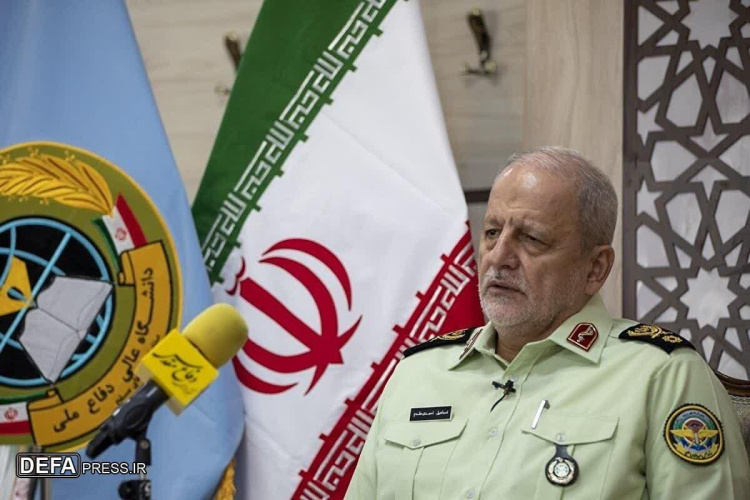Major General Dr. Ahmadi-Moghadam: The Shared Key to Victory in Operation Mersad and the 12-Day War Was the Unified Presence of the People in the Field

According to the Communications and International Relations Center of the Supreme National Defense University, Brigadier General Dr. Ahmadi-Moghadam, the head of the University, discussed the dimensions of Operation Mersad and the conditions of that era in an interview with the Defenders of Sacred Defense News Agency. He highlighted the general atmosphere in the final months of the imposed war by the Ba'ath regime of Iraq against Iran, stating that during this period, the country faced challenges such as the consensus of the enemies of the Islamic Revolution, the arming of the Ba'ath regime with chemical weapons, attacks on oil tankers in the Persian Gulf, a restriction on oil exports, and severe economic pressure. He noted that even the enemy's long-range aircraft targeted the Neka power plant and the Strait of Hormuz, ultimately culminating in the attack on our passenger plane by the Americans in the Persian Gulf.
Acceptance of the Resolution and Saddam's Renewed Aggression
Major General Dr. Ahmadi-Moghadam continued, stating that Iran accepted United Nations Security Council Resolution 598 on July 18, 1988. However, despite his initial endorsement of the resolution, Saddam did not accept the ceasefire and launched extensive attacks in the south and west of the country, resulting in the advancement of his forces to key areas such as Ahvaz, Khorramshahr, Somar, and Gilan-e Gharb.
He added that these operations laid the groundwork for the attack by the Monafeghin with the aim of overthrowing the Islamic Republic. Under the name of "Eternal Light Operation or Frough Javidan," they advanced from Sarpol-e Zahab to near Kermanshah without serious resistance, covering approximately 160 kilometers into Iranian territory within 8 to 10 hours. The then-commander of the Najaf Ashraf Headquarters pointed out the reduction of combat forces in the country following the acceptance of the resolution and the assumption of an end to the war. He emphasized that after the Monafeghin 's attack, the Islamic Republic of Iran quickly organized its scattered forces, mobilized units from the rear of the IRGC and the Army, and, with the support of air and helicopter forces, was able to contain this surprise attack.
Major General Dr. Ahmadi-Moghadam stated that despite the air support from Saddam's army, the Monafeghin suffered a severe defeat. He emphasized that the end of the war was seen by the Islamic Republic of Iran as a victory and a defeat for its enemies, including the Ba'athist forces and the Monafeghin, who have claimed the lives of over 17,000 Iranians. He praised the stance of Imam Khomeini in accepting the resolution, noting that while officials were prepared to take responsibility for accepting it, Imam Khomeini himself took on that responsibility, turning this decision into a lasting memory of his greatness and accountability.
Major General Dr. Ahmadi-Moghadam, recalling the sacrifices of the popular forces and the unknown martyrs during Operation Mersad, stated that the common factor in the victory of Operation Mersad and the 12-day imposed war was the unified presence of the people in the field. He noted that during Operation Mersad, despite the lack of artillery and ground support fire, our forces resisted with light weapons, and the people joined them; just as in the recent imposed war by the Zionist regime, the unified, powerful, and united people stood alongside the armed forces and were present in the field, supporting and backing their system.
This commander of the Sacred Defense era emphasized that the role of Martyr Sayyad Shirazi in coordinating this operation and Martyr Shushtari as the commander of the Najaf Headquarters was crucial.
The Enemy's Lack of Understanding of the Spirit of the Iranian People
The head of the SNDU attributed Operation Mersad and the recent attack by the Zionists on the country to the enemy's lack of a precise understanding of the internal dynamics of Iran. He stated that the enemies of the country always base their analyses on the superficial layers of our society, overlooking the deeper layers that reflect the profound connection of the people with the Islamic Revolution and Iran.
He continued, stating that the people of Iran set aside their differences and unite in times of threat; this unity and cohesion among the populace is the most important support for the armed forces. He noted the distinction between superficial discontent and opposition, saying that while discontent is natural and even constructive, it does not equate to a desire for the collapse of the system or the division of the country.
"The Exiled Opposition Lacks Standing Among the People"
Brigadier General Dr. Ahmadi-Moghadam, referring to the low status of the opposition groups in exile in the domestic scene, stated that they are not even taken seriously by the enemies of the Islamic Republic. In a sense, they are more about performance and are pursuing political gain. He emphasized the importance of vigilance among officials and the public, noting that the strategic advantage of the Islamic Republic lies in its ability to quickly recover and deliver a decisive blow. This was evident during the imposed war as well as in the recent conflict with the Zionist regime. However, we must not underestimate the threats and should avoid a reductionist perspective.
"We Are Prepared to Face Threats"
The head of the SNDU concluded by stating that in recent years, the Islamic Republic has significantly increased its defensive readiness and now possesses a high level of deterrence. The Iranian people play an unparalleled role in thwarting the enemy's plans through their active presence, which he described as a divine blessing for the Islamic Republic.



Your Comment :